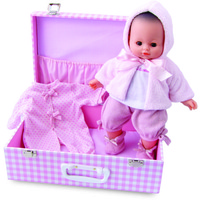Adorable Kids’ Dolls - Your Child’s First Friend

Dolls are vital to the psychological development of your child. They help to improve motor and social skills and are a lot of fun to play with
Dolls are the one of the most popular toys designed for children. Not only do dolls encourage imagination through pretend play, they help with cognitive development, nurturing and care-giving instincts, body recognition and they can even teach children how to identify, sort and organize objects using their doll accessories. Even newborn babies, who are unable to grasp and hold larger toys, can benefit from a doll's familiar face. It's true that dolls have gained a reputation as being a toy strictly for girls, but it's just as important for boys to develop the skills that doll play teaches. When children of both genders and various ages benefit, you know that it's a toy that's worth having many of. A kids’ dollhouse and dolls are some of the best toys you can invest in for your child.
Encourage Facial Recognition
Newborn babies are fascinated by faces. They're only able to see about a foot in front of their eyes during these early months, so they try to distinguish objects to improve vision. Faces, whether real or pretend, stimulate a baby's mind, and once you begin showing the baby their own reflection, they'll start to see a newborn baby doll as a toy that looks just like them. By touching and feeling a doll's face and limbs, they'll learn what different facial and body features feel like, and where they're located. If you expose the baby to many different dolls, then they will also develop an understanding of the differences between real faces and doll faces.
Having a doll as a model can also help children learn how to recognize eyes, ears, arms, legs and any other features they have in common. It's also an opportunity to learn object recognition with doll shirts, pants, dresses and shoes. If your child is beginning to accumulate a lot of small pieces and accessories to keep track of, purchasing them some storage bins or specially designed doll storage will teach them about sorting and organization.
Provide a Source of Comfort
While newborn babies can't cuddle with toys at this age, the presence of a familiar doll at the end of their crib can be comforting, especially if the doll smells like you from frequent handling. Keep in mind, however, that it's not safe to put soft toys in the crib due to the high risk of suffocation. Baby dolls that are made of plastic and are wearing very little clothing might be alright as long as the toy is as far away from the baby as possible.
Encourage Development of Fine Motor Skills
For children that are toddler-aged and up, a new baby doll can be a great way to learn fine motor skills and other important developmental lessons. When a child practices feeding, dressing and undressing and even bathing their doll, they're learning how to properly dress and undress themselves, as well as how to hold eating utensils. They also begin to associate their relationship with their doll to their relationship with their own caregiver, which will help them understand normal human behavior and what it means to eat, to take baths or go to sleep.
Prepare Your Child for a Sibling
If you have another baby on the way, it can also be beneficial to give your child a doll to help them prepare for their sibling. Using their newborn baby doll, you can begin to teach them lessons about how fragile babies are, and play act as if the new baby is already here. This might also help them get excited for their new brother or sister and develop nurturing habits that they'll continue to use as an older sibling.
Apart from baby dolls, you can also give your child a doll that appears closer to their own age. Rather than taking care of the doll, they will think of the doll as their friend, and they’ll feel comforted in times of stress or anxiety. Some Petitcollin dolls also come with a few different outfits, so they can learn about dressing for different occasions. When your children can identify when it’s appropriate to wear t-shirts and when it’s better to wear a dress, they come closer to picking out their own clothes and dressing themselves, which is an important step towards maturity.
Encourage Navigation and Creativity
When your child plays with smaller dolls inside a modern dollhouse, they will also relate the furniture they see in their dollhouse to the furniture they see around them. From navigating around their own house, they know that the table goes in the kitchen and the couch goes in the living room, and dollhouse play gives them a chance to reinforce this knowledge. A Classic World dollhouse even includes an attic, a porch and a basement so the child can learn about these different terms for rooms in their house as well.
If your child decides to put the toilet in the bedroom, however; you are seeing their imagination at work. Playing with dollhouse dolls breeds great storytellers because children will often give their dolls names and relationships and act out their own stories. While doll play is a great way to practice mimicry, encourage your children to pretend whatever scenarios they can imagine. It’ll help them develop their creativity.
Facilitate Interaction
In the early years of their lives, children learn a great deal by mimicking what they see in adults and how adults interact with them. Because dolls look just like other people, children can act out what they've observed in order to learn more about human behavior, including the context of the many things they see people doing. Dollhouses create a more direct model for children to use to imitate their own daily lives, and they often assign identities to their dolls that coincide with roles they’ve encountered outside the house. When you have the time, sit with your child as they’re playing with their dollhouse dolls or newborn baby doll and encourage them to tell you what they’re doing. Children love to share their ideas, and if you give them positive reinforcement, they’ll gain confidence in their own creativity.
Whether your child is a newborn or nearing elementary age, or whether they’re a boy or a girl, doll play contributes to crucial stages of your child’s development. Most children will choose favorites, but having more than one doll can allow them to act out human interactions they observe every day. It’s just one way of helping your child understand the world around them.







